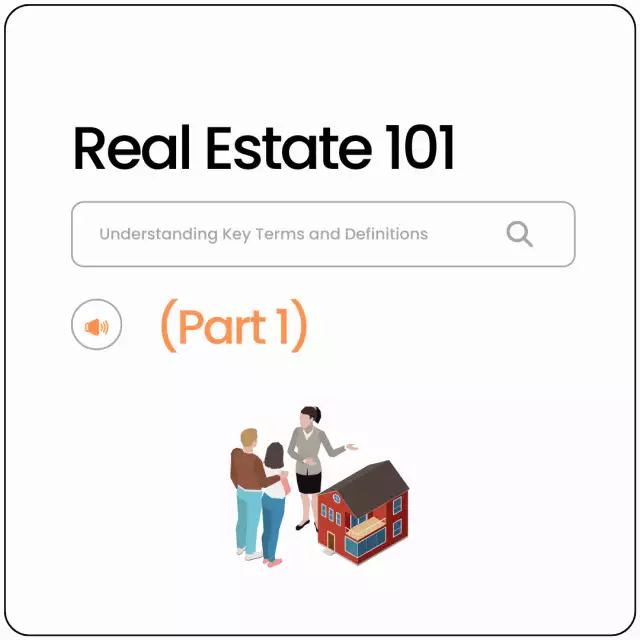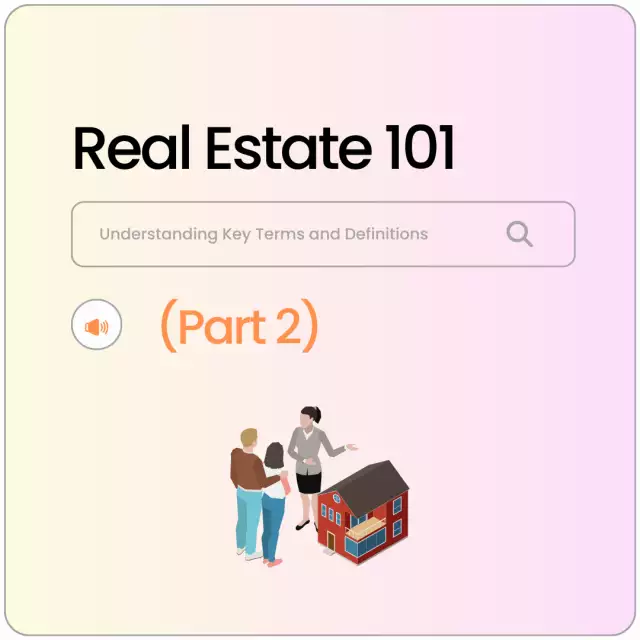Real Estate 101: Understanding Key Terms and Definitions (Part 1)
Real Estate 101: Understanding Key Terms and Definitions (Part 1)
Real estatecan be a complex and confusing industry, with many different terms and definitions that may be unfamiliar to those who are not in the industry. Whether you are a first-time homebuyeror a seasoned real estate investor, understanding these terms is essential to making informed decisions and achieving success in the market. In this blog post, we will explore some of the most common real estate terms and definitions.
Acceleration Clause
An acceleration clause is a provision in a loan agreement that allows the lender to demand full repayment of the loan immediately if certain conditions are not met, such as missed payments or default on the loan. This clause gives the lender the right to accelerate the loan and demand full payment, which can result in foreclosure if the borrower is unable to comply.
Active Contingent
An active contingent is a status given to a property that is under contract but has certain contingencies that must be met before the sale can be finalized. For example, a buyer may have a contingency that the sale is contingent on the sale of their current home. Until all contingencies are met, the property remains in an active contingent status.
Addendum
An addendum is a document that is added to a contract after it has been signed. This document can be used to add or modify terms and conditions of the original contract, as well as to clarify any ambiguities that may exist. Addendums are commonly used in real estate transactions to add contingencies or make other changes to the original purchase agreement.
Adjustable-Rate Mortgage (ARM)
An adjustable-rate mortgage, or ARM, is a type of mortgage where the interest rate can fluctuate over time. The interest rate on an ARM is typically lower than a fixed-rate mortgage, but the rate can increase or decrease based on market conditions. ARMs are often used by homebuyers who plan to sell or refinance their home before the interest rate adjusts.
Adjustment Date
The adjustment date is the date on which the interest rate on an adjustable-rate mortgage is adjusted. This date is typically set in advance and can be several years after the loan is originated. The adjustment date is important to borrowers because it can result in a change in their monthly mortgage payment.
Amortization
Amortization is the process of paying off a debt over time, typically through a series of regular payments. In the context of real estate, amortization typically refers to the process of paying off a mortgage through regular payments of principal and interest. The payment is calculated so that the borrower will pay off the loan by the end of the loan term.
Annual Percentage Rate (APR)
The annual percentage rate, or APR, is the total cost of borrowing money expressed as an annual percentage. The APR includes not only the interest rate on the loan but also any fees or charges associated with the loan. This allows borrowers to compare the total cost of different loan offers to determine which is the best option for them.
Appraisal
An appraisal is an estimate of the value of a property, typically conducted by a licensed appraiser. Appraisals are important in real estate transactions because they help lenders determine how much money they can lend to a borrower based on the value of the property. Appraisals are also used by buyers and sellers to negotiate the price of a property.
Appreciation
Appreciation is the increase in the value of a property over time. This can be due to a variety of factors, including improvements made to the property, changes in the local real estate market, and inflation. Appreciation is important to real estate investors because it can result in significant profits when the property is sold.
Assessed Value
The assessed value is the value of a property as determined by a tax assessor for the purpose of calculating property taxes. The assessed value is typically based on the market value of the property, but may also take into account other factors such as the condition of the property and any improvements made to it. The assessed value can be used as a starting point for negotiating the sale price of a property, but it is important to note that it may not reflect the true market value of the property.
In conclusion, understanding these real estate terms and definitions can help buyers, sellers, and investors make informed decisions in the complex world of real estate. From the importance of appraisals and the intricacies of amortization to the potential benefits of appreciation, these terms are essential to navigating the market and achieving success. Stay tuned for Part 2 of our real estate terms and definitions series, where we will explore more key concepts in the industry.


